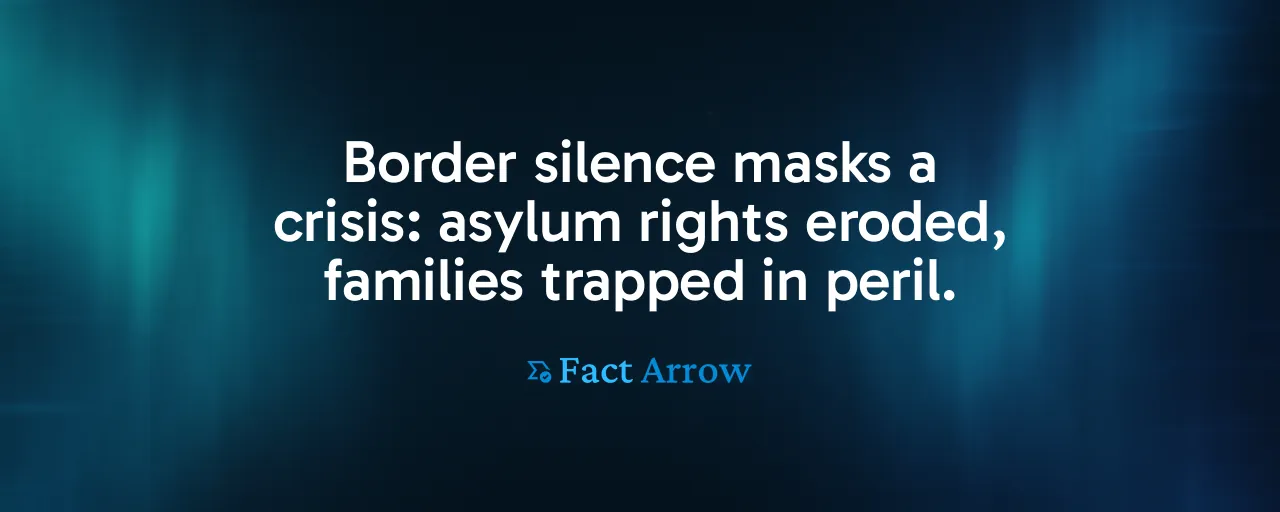A Border Gone Quiet
The U.S.-Mexico border, once alive with the footsteps of desperate families, now lies still. A year ago, Border Patrol agents met over 100,000 migrants each month. Today, they count fewer than 10,000. Shelters that once buzzed with hope stand empty, their beds untouched. Local officials, no longer overwhelmed by arrivals, express relief. President Trump's second term has delivered on a key promise to curb migration. But what have we sacrificed to achieve this silence?
This quiet echoes human suffering pushed out of sight, far from any victory. Policies that have nearly erased asylum rights leave families and children stranded in Mexican border towns, facing cartel violence and extortion. The White House calls this success, but it feels more like a betrayal of our nation's promise to offer refuge to those in need.
Fortress Over Compassion
The statistics are striking: border apprehensions have dropped 95% since last year, fueled by 10,000 deployed troops, rapid wall construction, and a national emergency declaration. A new House spending bill commits $150 billion to enforcement, with $51 billion for walls and $59 billion for detention, far outpacing investments in schools or healthcare. This approach, supported by 77% of Republican voters who back harsh barriers, chooses fear over empathy. Does it truly protect us?
Independent reports reveal a darker truth. The 2024 asylum-ban rule has left thousands trapped in Mexico, where kidnappings and assaults are rising. Amnesty International states that asylum is now 'non-existent' for families and unaccompanied minors. The UN warns these tactics violate international law by risking collective expulsion. Still, the administration expands family detention centers, aiming for 100,000 beds, reviving past horrors of overcrowding and poor care.
Some claim this protects sovereignty, arguing migration harms wages and culture. Yet, evidence suggests otherwise. Immigrants contribute $8.9 billion in state taxes per million residents, while mass deportations, costing $88 billion annually, weaken industries like agriculture and construction. Far from strengthening us, this approach undermines our economic foundation.
Lives Caught in the Crossfire
Beyond the data lie human tragedies. Migrants, blocked by walls and fast-tracked deportations, face deadly dangers in Mexico. WOLA notes a 94% drop in releases from Border Patrol custody, with nearly half of those apprehended now expelled without hearings. Families and LGBTQ+ individuals, denied legal pathways, endure extortion and violence. The suspension of the CBP One app has left even children without safe options to seek asylum. How can we justify this suffering?
History offers a sobering lesson. Since 1994's 'prevention through deterrence' policy, over 8,000 migrants have perished in remote deserts, a direct consequence of militarized borders. Plans to reinstate Title 42 expulsions will likely increase risky crossings. Detained families face overcrowded facilities and limited legal support, echoing lawsuits from Trump's first term. These policies shatter lives, proving far more destructive than a simple deterrent to migration.
A Humane Alternative
A better path exists. Advocates for migrant rights, supported by 87% of liberal Democrats, urge restoring asylum processes and creating citizenship pathways. The American Immigration Council emphasizes that refugees, thoroughly vetted, boost our economy, countering fears of abuse. Funding legal representation and community programs, rather than walls, could clear court backlogs and process claims fairly. Why choose division when we can build stronger communities?
Current spending reveals misplaced priorities: $200 billion for enforcement overshadows $840 million for immigration courts. Democratic proposals to hire 1,600 asylum officers would speed up adjudications while upholding due process. Investing in foreign aid to tackle migration's root causes, like violence and poverty, offers lasting solutions, unlike walls that merely redirect desperation. These steps honor our values and strengthen our nation.
Our Nation at a Crossroads
The border's stillness masks a profound loss: our commitment to humanity. As net migration turns negative, Brookings predicts labor shortages and shrinking GDP. Border towns like El Paso face declining retail sales and fraying cultural ties. Each deportation drains tax revenue and destabilizes industries. This trajectory threatens our economic future and our compassion.
We face a defining choice. Will we restore a system that upholds asylum and integration, or cling to a fortress that isolates us? The answer is clear: revive legal pathways, fund fair processes, and reject fear-based policies. Our strength lies in welcoming those who seek safety, rather than in building higher walls. Let's act now to reclaim our values and build a future we can be proud of.
